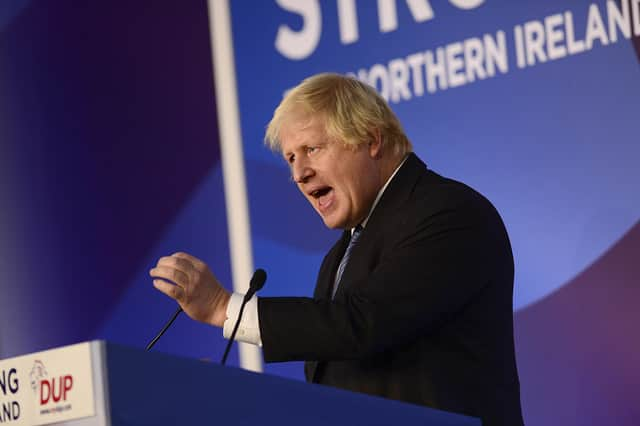Ben Lowry: For some reason unionists would not turn against Boris Johnson


When I look at it, particularly when I look at Mr Johnson’s expression, it takes me back to that extraordinary day.
I was there.
As is now famous, and as is visible on Youtube clips online, the then would-be Tory politician was quite explicit on what he said. In a flagrant bid to undermine his then leader, Theresa May, he said of her EU agreed backstop:
Advertisement
Hide AdAdvertisement
Hide Ad“We would be damaging the fabric of the Union with regulatory checks and even customs controls between Great Britain and Northern Ireland on top of those extra regulatory checks down the Irish Sea that are already envisaged in the Withdrawal Agreement. Now I have to tell you no British Conservative government could or should sign up to any such arrangement.”
DUP delegates cheered.
In the months before and after that I was tracking how the language of top Tories was moving to references to no ‘customs’ border (ie tariffs) between Northern Ireland and Great Britain.
I thought that such talk was paving the ways for a regulatory border (ie over standards of goods’). It was taking advantage of the fact that few people would know the difference between the two (as indeed I would not have known a few years before). Such ignorance would have facilitated the quiet introduction of a regulatory border in the Irish Sea.
I even asked Downing Street in September 2018 to address the matter of a regulatory border, after Theresa May had dismissed any notion of a ‘customs’ border, but it replied to say that one thing she “cannot accept is seeing NI carved away from the UK customs territory”.
Advertisement
Hide AdAdvertisement
Hide AdIn other words, No 10 failed to address the question, and so failed to deny such a possibility.
Soon Boris Johnson, for all his tough talk in Belfast in late 2018, was preparing his own movement towards an Irish Sea border. And barely anyone was questioning him about it. But again, the language shift was becoming apparent.
I noticed that after meeting Arlene Foster in July 2019, on a visit that formed part of the Tory leadership race, he tweeted a picture alongside the then DUP leader at Stormont, saying: “If I become PM, under no circumstances will there be a hard border on the island of Ireland, nor will I accept a deal that sees NI taken out of the UK’s customs territory.”
You see? He too specified customs.
And sure enough, weeks later, in early October, the first version of his protocol plan (one agreed by the DUP, albeit it points out only on the basis of a Stormont lock) only involved a regulatory border in the Irish Sea, and not a customs one.
Advertisement
Hide AdAdvertisement
Hide AdSoon Mr Johnson abandoned this half border, and agreed to a customs one too, and effectively gave the EU what it wanted entirely.
When I have previously recapped on this saga, defenders of Mr Johnson have pointed out various mitigating factors in his behaviour, including the fact that parliament was deadlocked and without such a move Brexit might not have happened. This is true and is some grounds for the UK now saying it agreed the protocol under duress.
But it does not explain why Mr Johnson was so thrilled when he went to Europe days after his deal with Leo Varadkar, and why he delighted in being the toast of EU leaders for giving them what they wanted — Northern Ireland, as the price of a Brexit deal. He was not crestfallen at having had to jettison part of his nation to get a deal.
I recap on all this not to be vindictive about Mr Johnson, but to illustrate two things about him. An utterly ruthless streak, which many leaders possess, particularly war ones. But also a profound flaw in his character, which was ultimately his undoing. An obsessive self promotion that made him many enemies, as we saw this week, but also left him an almost listless politician, seemingly without conviction other than his own advancement.
Advertisement
Hide AdAdvertisement
Hide AdHe is a complex personality because his newspaper comment articles over the years revealed a thoughtful, highly intelligent man.
Is this one reason why unionists to this day have never turned on him, despite his betrayal of us?
It is not, as some cynics say, sycophancy. Most Ulster unionists do not have a natural affiliation with Etonians, even if they don’t actually resent them.
I think it is strange that he did not become a pariah like Margaret Thatcher did after the 1985 Anglo-Irish Agreement betrayal (which is what that wretched deal assuredly was).
Advertisement
Hide AdAdvertisement
Hide AdThis unionist tolerance of Boris might be partly rooted in his disarming charm – his personality never seemed as ruthless as his actions could be.
It is also because many unionists became so invested in the Brexit project as to be unable to accept how one of its architects treated their support for that cause.
And it is also perhaps a reflection f cumulative fatigue over the decades after yet another major disappointment for unionism.
• Ben Lowry (@BenLowry2) is News Letter editor
• Ben Lowry: Memories of the Japanese prime minister in Fermanagh
Advertisement
Hide AdAdvertisement
Hide Ad• Ben Lowry July 2: This is a rare time when the UK is prepared to clash with Ireland
• Ben Lowry July 2: London in early summer is a pleasant place to be
• Ben Lowry June 25: London has tipped into an amnesty
• Ben Lowry June 18: John Bolton’s criticism of Ireland reflects a strain of US thinking
• Ben Lowry June 11: BBC NI is downgrading its Twelfth output but pretending otherwise
• Ben Lowry June 11: Remembering the joy of watching Billy Bingham